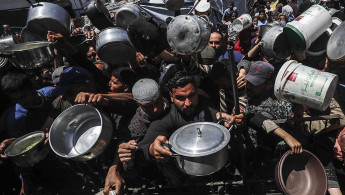
Gazans reject Israeli food distribution as another form of occupation
Gazans reject Israeli food distribution as another form of occupation
A new US-Israeli plan to distribute supplies in Gaza has sparked anger and distrust among Palestinians, who said the plan was not as a relief effort but as a new form of occupation.
Unveiled last week by US Ambassador to Israel Mike Huckabee on Friday, the initiative proposes the creation of four heavily guarded food distribution centres in Gaza, aimed at reaching approximately 1.3 million people, nearly 60 per cent of the enclave’s population.
Israel has cut off all aid to Gaza for the past two months, leaving the devastated territory on the verge of famine.
According to Huckabee, these centres would be run by the Gaza Humanitarian Foundation, a newly established private entity, with American private contractors providing security, while Israeli forces would guard the perimeter.
“The plan is framed as a means of ensuring aid reaches civilians and bypasses Hamas, which governs Gaza,” he claimed.
However, the plan also bypasses UNRWA, the UN agency which has provided a lifeline to millions of people in Gaza for decades.
For many Gazans, the plan represents yet another chapter in the suffering brought on by Israel’s collective punishment of them.
“They blame Hamas, but punish all of us,” said Mariam Khamis, 58, from Jabalia, who lost four grandchildren in an Israeli airstrike earlier this year.
“They bombed our fields, closed our borders, and now they want to feed us from their hands, under guard, with strings attached. This is not helpful. It’s humiliation,” she added.
Many Palestinians in Gaza view the initiative as a form of control, one that imposes foreign dominance over their lives under the guise of humanitarian aid.
“It’s not aid. It’s control masked as compassion,” Huda Barakat, a 39-year-old displaced woman from Gaza City, told The New Arab.
Now living in a tent at Al-Jundi Square in central Gaza City, Barakat recalled how she once worked with children to help them cope with trauma before the war.
“Before, I had dignity. I worked with families, had a role in society. Now, I’m begging for food while my children starve,” she said.
Barakat emphasised the psychological toll of the proposed aid plan. “They talk about food, but what they are really distributing is humiliation. We’re lined up under drones, watched by foreign soldiers, handed charity like we are less than human. This is not aid; this is control,” she added.
Barakat’s sentiments were echoed by others in Gaza. Tareq Abu Rashed, a 45-year-old former grocery shop owner who now lives with his wife and six children in a UN-run school in Khan Younis, described the initiative as humiliating.
“They’ve decided to hand over our most basic human needs [food and water] to a private company, foreign guards, and soldiers who already bombed our homes. This is not about helping people; it’s about who gets to control us,” he told TNA.
Abu Rashed, who once ran a small shop in Gaza City, reflected on the drastic change in his life since the war began. “Before, I chose what I sold, interacted with customers, and cared for my family with pride. Now I’m told where to stand. This isn’t aid; it’s a performance of power,” he said.
The initiative, Huckabee argues, is designed to ensure aid is delivered to civilians while bypassing Hamas. Aid will only be distributed once a week and the amounts strictly controlled, leading to accusations that only enough to prevent people starving to death.
“They erase us as political actors and turn hunger into a tool of control,” he said. “This plan reduces us to a passive population, fed, watched, and silenced.”
Mahmoud Deeb, a 26-year-old community volunteer from Deir al-Balah, said that the plan was all about public relations.
“They bomb our bakeries, block convoys, cut funding to UNRWA, and then say, ‘Look, we’re feeding them.’ It’s a public relations stunt built on the bones of starving people,” Deeb said.
He has been part of grassroots efforts to provide aid under fire, coordinating with local networks to help families survive.
“Rather than assisting us, they prefer introducing outsiders armed with weapons. They fail to recognise that Palestinians can save themselves,” he explained.
The plan has also drawn sharp criticism for sidelining both the Palestinian Authority (PA) and local NGOs, as well as UNRWA.
Critics warn that the initiative could impose long-term system of foreign-managed dependency on Gaza, further stripping Palestinians of their political rights and institutional sovereignty, reducing them to passive recipients of aid, and cementing foreign control.
Rawhi Fattouh, head of the Palestinian National Council, condemned the plan, calling it “a dangerous racist project” designed to isolate Palestinians in apartheid-style enclaves.
“This has nothing to do with humanitarian work. It aims to humiliate Gazans and push them toward forced displacement, while dismantling the Palestinian cause,” Fattouh said in a press statement.
He warned that the initiative is part of a broader effort to undermine the role of UNRWA.
Fattouh called on the international community to reject the plan, labelling it a violation of international humanitarian law and urging the world to stand against Israel’s ongoing blockade and collective punishment of Gaza’s population.
Hamas officials have also rejected the plan. Basem Naim, a senior member of the group, compared it to Israel’s militarisation of humanitarian aid.
“This plan is not far from the Israeli vision of turning aid into a tool of control,” Naim said in a press statement.
He pointed to past US-backed initiatives, such as the floating pier project, which failed due to its political motivations.
